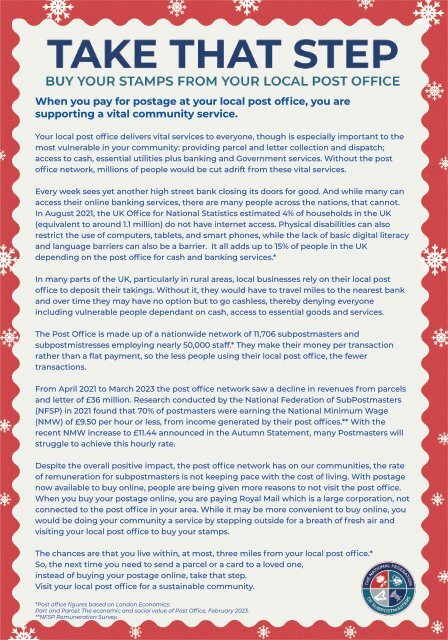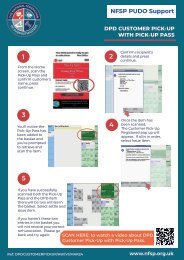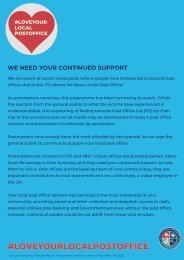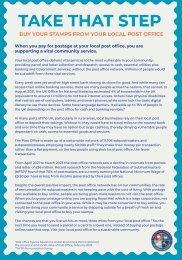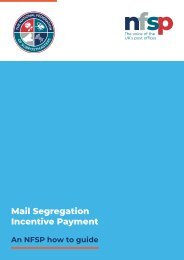Take that step explainer article
- No tags were found...
You also want an ePaper? Increase the reach of your titles
YUMPU automatically turns print PDFs into web optimized ePapers that Google loves.
When you pay for postage at your local post office, you are<br />
supporting a vital community service.<br />
Your local post office delivers vital services to everyone, though is especially important to the<br />
most vulnerable in your community: providing parcel and letter collection and dispatch;<br />
access to cash, essential utilities plus banking and Government services. Without the post<br />
office network, millions of people would be cut adrift from these vital services.<br />
Every week sees yet another high street bank closing its doors for good. And while many can<br />
access their online banking services, there are many people across the nations, <strong>that</strong> cannot.<br />
In August 2021, the UK Office for National Statistics estimated 4% of households in the UK<br />
(equivalent to around 1.1 million) do not have internet access. Physical disabilities can also<br />
restrict the use of computers, tablets, and smart phones, while the lack of basic digital literacy<br />
and language barriers can also be a barrier. It all adds up to 15% of people in the UK<br />
depending on the post office for cash and banking services.*<br />
In many parts of the UK, particularly in rural areas, local businesses rely on their local post<br />
office to deposit their takings. Without it, they would have to travel miles to the nearest bank<br />
and over time they may have no option but to go cashless, thereby denying everyone<br />
including vulnerable people dependant on cash, access to essential goods and services.<br />
The Post Office is made up of a nationwide network of 11,706 subpostmasters and<br />
subpostmistresses employing nearly 50,000 staff.* They make their money per transaction<br />
rather than a flat payment, so the less people using their local post office, the fewer<br />
transactions.<br />
From April 2021 to March 2023 the post office network saw a decline in revenues from parcels<br />
and letter of £36 million. Research conducted by the National Federation of SubPostmasters<br />
(NFSP) in 2021 found <strong>that</strong> 70% of postmasters were earning the National Minimum Wage<br />
(NMW) of £9.50 per hour or less, from income generated by their post offices.** With the<br />
recent NMW increase to £11.44 announced in the Autumn Statement, many Postmasters will<br />
struggle to achieve this hourly rate.<br />
Despite the overall positive impact, the post office network has on our communities, the rate<br />
of remuneration for subpostmasters is not keeping pace with the cost of living. With postage<br />
now available to buy online, people are being given more reasons to not visit the post office.<br />
When you buy your postage online, you are paying Royal Mail which is a large corporation, not<br />
connected to the post office in your area. While it may be more convenient to buy online, you<br />
would be doing your community a service by <strong>step</strong>ping outside for a breath of fresh air and<br />
visiting your local post office to buy your stamps.<br />
The chances are <strong>that</strong> you live within, at most, three miles from your local post office.*<br />
So, the next time you need to send a parcel or a card to a loved one,<br />
instead of buying your postage online, take <strong>that</strong> <strong>step</strong>.<br />
Visit your local post office for a sustainable community.<br />
*Post office figures based on London Economics:<br />
Part and Parcel: The economic and social value of Post Office, February 2023.<br />
**NFSP Remuneration Survey.


